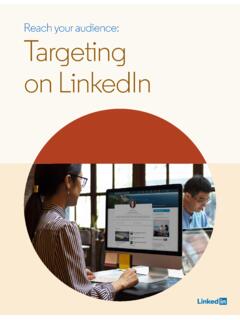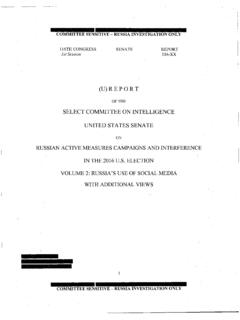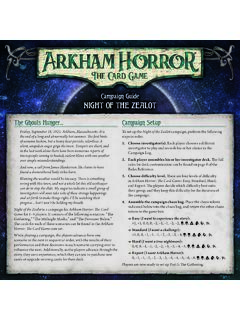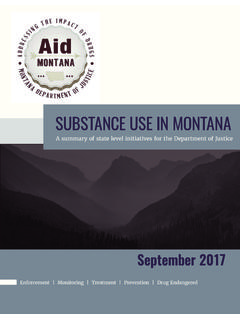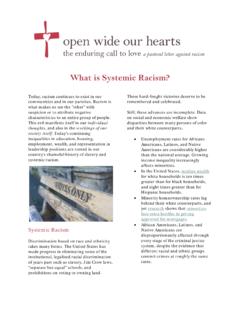Transcription of I. IRC 527 - POLITICAL ORGANIZATIONS - IRS tax forms
1 I. IRC 527 - POLITICAL ORGANIZATIONS 1. Introduction and Background Until 1975, the Code did not specifically address the tax status of POLITICAL ORGANIZATIONS , such as POLITICAL parties, campaign committees, and POLITICAL action committees (PACs). When the issue was addressed at all, their tax treatment was governed by Service administrative interpretations. Rev. Proc. 68-19, 1968-1 810, held that " POLITICAL funds" were not taxable to the candidate on whose behalf they were collected. The tax treatment of POLITICAL parties and committees, however, was not addressed until 1973, when the Service published Announcement 73-84, 1973-2 461. In that announcement, the Service concluded that no specific provision in the Code justified its "long-standing practice" not to require POLITICAL ORGANIZATIONS to file returns and pay tax. Therefore, the investment income of POLITICAL parties and committees, including dividends, interest, and capital gains, was subject to tax.
2 The announcement noted, however, that the Service would defer enforcement until Congress had given the problem specific consideration. Those rules set forth in Announcement 73-84 were restated in Rev. Rul. 74 21, 1974-1 14, clarified in, Rev. Rul. 74-475, 1974-2 22. The revenue ruling concluded, on a prospective basis, that POLITICAL ORGANIZATIONS were not exempt from federal income tax, and would be taxed on interest, dividends, and capital gains from sales of securities, less deductible expenses directly attributable to producing that income. ORGANIZATIONS subject to tax were required to file form 1120. As Announcement 73-84 indicates, the tax treatment of POLITICAL parties was being considered by Congress in 1973. When then Secretary of the Treasury, George Schultz, appeared before the Ways and Means Committee in April 1973 to testify on tax reform, he discussed the need to spell out the rules on the taxation of POLITICAL parties.
3 Congressional response was to enact IRC 527, effective for tax years beginning after December 31, 1974. IRC 527 provides that " POLITICAL ORGANIZATIONS " are subject to tax only to the extent provided for in that section. For all other purposes under federal law, they are treated as tax exempt ORGANIZATIONS . IRC 527 imposes a tax on the " POLITICAL organization taxable income" of POLITICAL ORGANIZATIONS - broadly speaking, income from sources other than contributions, membership dues, and fundraising events. (For most POLITICAL ORGANIZATIONS this means income from passive investments such as interest, dividends, and capital gains.) Where otherwise exempt income is not used for the POLITICAL purposes that are the basis of these ORGANIZATIONS ' exemption, it is treated as " POLITICAL organization taxable income" as well. IRC 527 also establishes rules for when expenditures of funds by POLITICAL ORGANIZATIONS will be included in gross income of individuals.
4 Finally, it provides special rules for "newsletter funds" maintained by holders of and candidates for public office, and for IRC 501(c) ORGANIZATIONS that engage in POLITICAL activity. Effective October 1, 1988, the Exempt ORGANIZATIONS function of the Service assumed responsibility for interpreting and administering IRC 527. This article discusses IRC 527 as it relates to POLITICAL ORGANIZATIONS , and updates an article in the 1983 CPE text on 501(c) exempt ORGANIZATIONS and IRC 527. 2. "Exempt Function" A. Introduction The key concept in IRC 527 is that of "exempt function." (The term is defined in IRC 527(e)(2).) By definition, POLITICAL ORGANIZATIONS are entities that are organized and operated for the purpose of collecting contributions for or making expenditures for an "exempt function." Income from contributions, membership dues, POLITICAL fundraising events, and from the sale of campaign material must be set aside or spent for "exempt function" purposes or it is taxable to a POLITICAL organization.
5 Finally, ORGANIZATIONS exempt under IRC 501(c) may be subject to tax on amounts spent directly on an "exempt function. " B. What is "Exempt Function"? IRC 527(e)(2) defines "exempt function" as "the function of influencing or attempting to influence the selection, nomination, election, or appointment of any individual to any Federal, State, or local public office or office in a POLITICAL organization, or the election of Presidential or Vice-Presidential electors, whether or not such individual electors are selected, nominated, elected, or appointed." In determining whether an activity is part of an IRC 527 organization's "exempt function," , the function of influencing or attempting to influence the selection process, one must examine the relationship between the activity and the purpose defined above. The regulations divide exempt function activities (expenditures) into those that are "directly" and "indirectly" related to this purpose.
6 "Directly related expenses" are defined in section (c)(1) of the regulations to include all activities directly related to and supporting the selection process. (The regulations use the term "selection process" to refer to the process of "influencing or attempting to influence the selection, nomination, election, or appointment of any individual to public office or office in a POLITICAL organization." Reg. (c)(1). Section (d) of the regulations delineates when an office will be considered a "public office.") Generally, where an organization supports an individual's campaign for public office, its activities and expenditures in the campaign further the selection process. The individual need not be an announced candidate for the office; that he or she never becomes a candidate is not crucial. Reg. (c)(1). Thus, travel, lodging, and meal expenses incurred for a candidate traveling through a state to rally support for his or her election to public office in that state are expenditures for an exempt function.
7 Reg. (c)(5)(i). Similar expenditures for the candidate's spouse are also for an exempt function if the spouse's participation is important to the candidate's election. Reg. (c)(5)(ii). Directly related expenses for exempt functions also include those for voice and speech lessons a candidate takes to improve skills for a campaign , Reg. (c)(5)(iii); and those to attend a testimonial dinner to aid a public office holder's re-election, Reg. (c)(5)(iv). Expenditures for an election night party for POLITICAL campaign workers are "an inherent part of, and the traditional public culmination of, the selection process," and therefore for an exempt function. Rev. Rul. 87-119, 1987-2 151, Q&A 1. Similarly, cash awards to campaign workers after the election are for an exempt function if the amount given each worker is reasonable, considering the exempt function services the worker rendered and the amount of other compensation, if any, already paid.
8 Id., Q&A 2. Expenditures to generate support for candidates with POLITICAL philosophies in harmony with that of an IRC 527 organization, such as those to finance seminars and conferences, are also for an exempt function. See Reg. (c)(5)(viii). That activities need not seek to influence a particular candidate's or office holder's own selection process is illustrated by Rev. Rul. 79-12, 1979-1 208. In that ruling, an elected legislator expended surplus POLITICAL campaign funds to attend a POLITICAL party convention, an activity involving the selection process. Therefore, the amounts were exempt function expenditures. Similarly, amounts expended for voter research, public opinion polls, and voter canvasses for a second office, drawn from surplus campaign funds from an earlier campaign , are for an exempt function (and not taxable to the candidate under IRC 527(d), see infra).
9 Rev. Rul. 79-13, 1979-1 208. Expenditures to purchase periodicals to enable an office holder to keep informed on national and local issues, however, do not relate to or support the selection process and are therefore not for an exempt function. Reg. (c)(5)(v). Similarly, expenses incurred by an incumbent's campaign staff in connection with work on a legislative item are not part of the selection process and therefore are not for an exempt function. See Rev. Rul. 87-119, 1987-2 151, Q&A 4. Excess campaign funds transferred to an office holder's office expense account are likewise not for an exempt function. Rev. Rul. 80-331, 1980-2 29. An activity engaged in between election cycles is an exempt function activity if it is directly related to the selection process in the next applicable POLITICAL campaign . Reg. (c)(1). The legislative history provides examples of permissible exempt function activities for a local POLITICAL party between elections: preparing for the next party convention, fundraising, and transacting intra-party or organizational business.
10 See S. Rep. No. 1357, 93d Cong., 2d Sess. 27 (1974), reprinted in 1975-1 517, 532; see also Reg. (c)(5)(vii). "Exempt function" also includes "indirect expenses," defined in section (c)(2). Indirect expenses are for an exempt function if "necessary to support the directly related activities of the POLITICAL ORGANIZATIONS ," , "those which must be engaged in to allow the POLITICAL organization to carry out the activity of influencing or attempting to influence the selection process." For example, a POLITICAL organization's solicitation of contributions is an exempt function activity. Similarly, expenses for overhead and record keeping are for an exempt function. 39178 (March 6, 1984) provides a good example of qualifying indirect expenses. In this , a corporation was organized and wholly controlled by an IRC 527 POLITICAL organization and its related ORGANIZATIONS , all of which were likewise IRC 527 POLITICAL ORGANIZATIONS .











